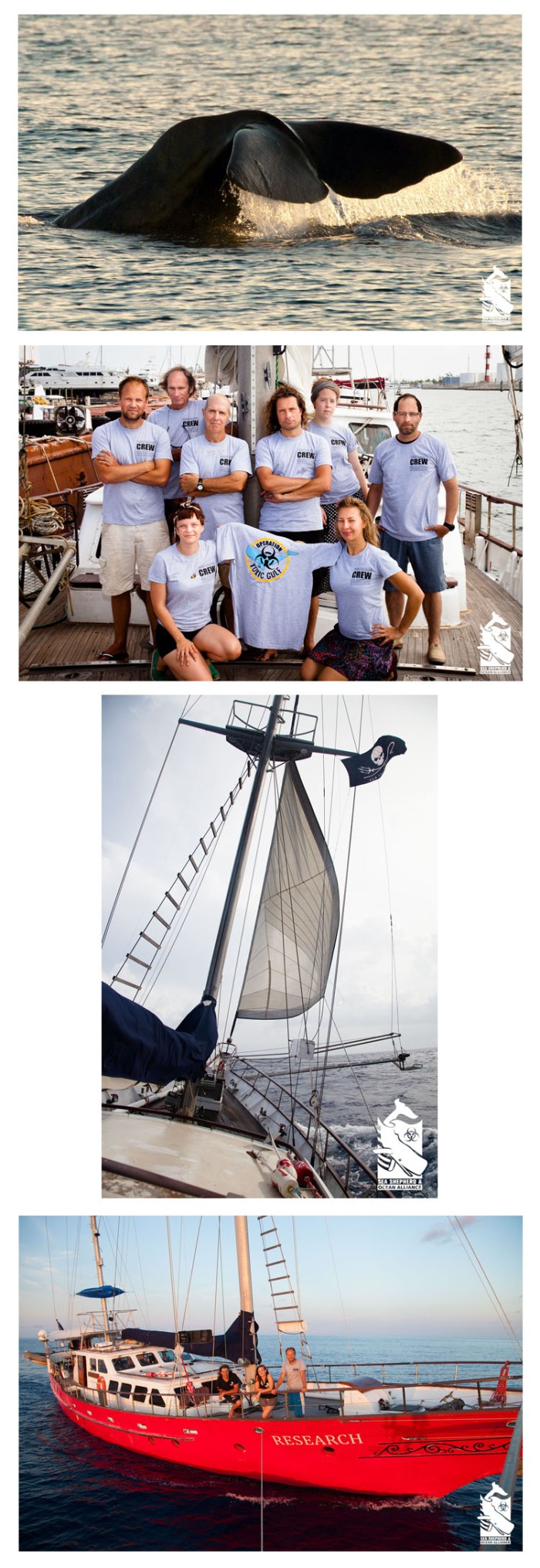Posting from very rough seas today in the Gulf of Mexico, we bring you the third crew blog by Ocean Alliance campaign leader Iain Kerr: on-board The R/V Odyssey for Operation Toxic Gulf.
I spend a lot of time captaining a desk nowadays so it is good to be back at sea with old and new friends and one of my favorite species sperm whales.
I do feel very frustrated by the lack of interest in whales in the Gulf of Mexico after the 2010 oil disaster. I have pounded the streets contacting pretty much every funding body I know to keep the RV Odyssey at sea each summer collecting data and yet as we move farther from the event funding is getting harder to come by. What scares me here is the fact that we have a unique toxicological experiment going on in the Gulf and we need to grab every bit of data we can – from my perspective our team is running through a burning library grabbing whatever books we can before the fire (or the chemicals used to put it out) irreparably damage or destroy the books. This then leads to what drives me as an individual.
I am impressed again and again by the depth of human compassion how people rise to the challenge when a crisis occurs. When the Tsunami devastated the Indian Ocean over $14 billion was raised internationally. In 2010 $3.4 billion was raised for Haiti relief in a matter of months.
During the 86 days of the oil disaster in the Gulf of Mexico millions of people were riveted to the video feed of oil escaping into the Gulf. They seemed to become addicted to the live feed of an unfolding catastrophe. I thought that the Gulf spill would be a pivotal moment in humanity’s relationship with the oceans. You can imagine, then, how stunned I was when the leak was capped and people simply changed channels and tuned out. For Gulf species and residents, the potential long-term consequences of one of the largest oil spill’s and greatest release of dispersants ever to occur on this planet are unimaginable. But with the images gone, public concern seems to vanish.
It seems that unless people have a strong, tangible image on which to focus their compassion, we are not very good at staying involved. I fail to understand how our species can be so compassionate and yet, in the case of the Gulf — the ultimate case of ocean pollution — so naive. Because the oceans are down hill from everything and gravity never sleeps, everything ends up in the seas; yet it appears that without imagery of an unfolding catastrophe everyone assumes that the oceans can take all that we throw at them.
When our President Roger Payne founded Ocean Alliance in 1971 he did so with the goal in mind of setting up a ‘pathfinder’ organization that would tackle the difficult jobs and blaze a trail. Over the last 39 years (working with our partners around the world) we have succeeded on this front at many levels, but I remain deeply concerned by the way that ‘The tragedy of the Commons’ is being played out in the oceans. Roger said in a 1979 National Geographic article, “Pollution has replaced the harpoon as a mortal threat to whales, and in its way can be far more deadly.”
Since that time, Ocean Alliance has been focusing its efforts on documenting the levels and effects of ocean pollution on marine mammals, even though, given our limited resources, it would be hard to tackle a more difficult job. The news on ocean pollution turns out to be deeply disturbing. Despite evidence that ocean pollution is affecting our lives and those of our children, people don’t seem to get engaged, let alone enraged about its potential consequences for whales and humanity.
Please, be enraged and get engaged!
Thanks to the support of Sea Shepherd Conservation Society Global Ocean Alliance will continue to collect data in the Gulf of Mexico this year and, write scientific papers and inform educators, policy makers, and the general public on wiser stewardship of our irreplaceable oceans and their marine mammal populations, and on the links between healthy oceans and our own health.
We hope that you will join us on this journey and thank you for your support — Oceans Matter


Thank you for all your hard work saving the whales and all marine life.
LikeLike